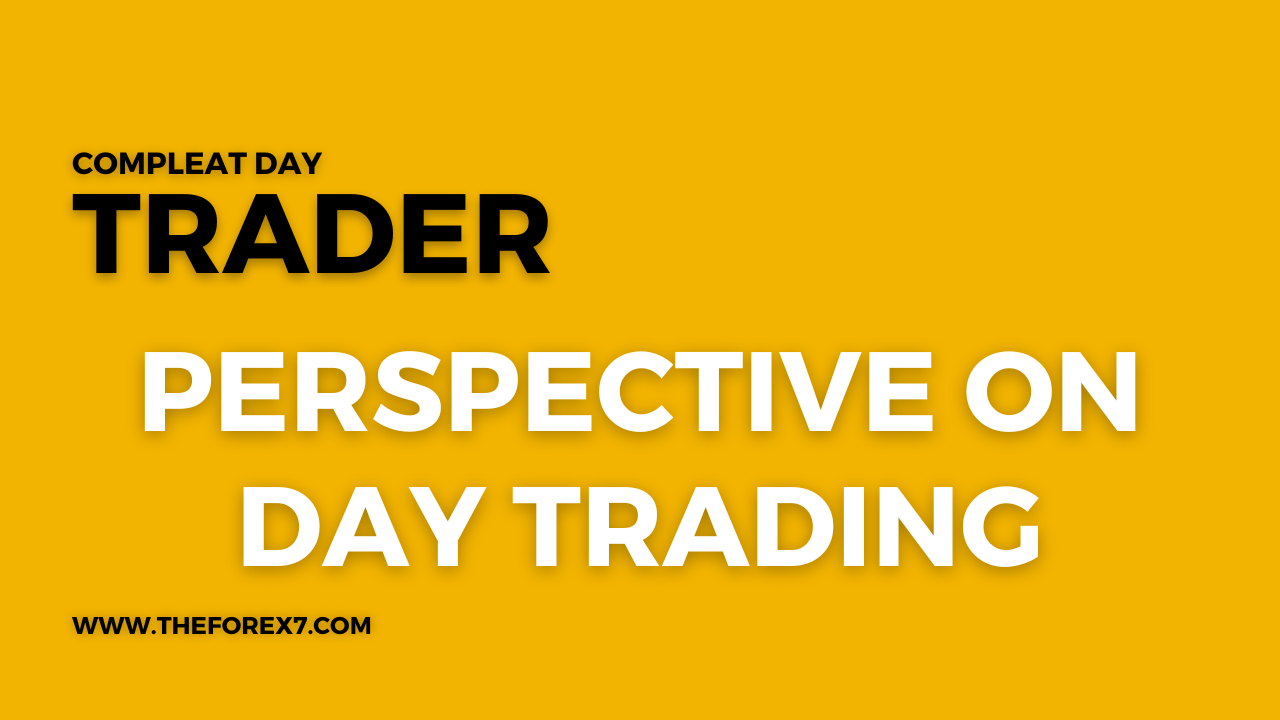The Psychology Of Day Trading
Patience, Impatience, Temperament, Using Market Sentiment, Day-Trading Opportunities, Sticking to Your Daily Goal, Avoid Overtrading, Accept Losses
Course: [ THE COMPLEAT DAY TRADER II : The Compleat Day Trader ]

Day trading is, at the same time, less psychologically demanding and more psychologically demanding than position trading. Or the one hand, day trading requires more discipline and self-control than does position trading.
The Psychology Of Day Trading
He bears the seed of ruin in himself.
MATTHEW ARNOLD
Day trading is, at the same time, less
psychologically demanding and more psychologically demanding than position
trading. Or the one hand, day trading requires more discipline and self-control
than does position trading; on the other hand, there is a certain peace of mind
that comes with the knowledge that you are "clean
and clear" at the end of the
day. When people have asked me why I prefer day trading to position trading, I
quickly reply that "I like to sleep at
night." While this may seem
at first blush to be a flippant response, there is much truth to it. The good
news about day trading is that it permits the trader to walk away from the
markets at day's end knowing that there is nothing that can happen overnight to
affect his or her account balance other than a total economic collapse or
bankruptcy of the firm that carries the account.
Position traders, however, will argue that by
limiting one's trading to the time frame of 1 day, potentially significant
profit opportunities are lost. And this may very well be the case. But trading
opportunities are very much like paying taxes—it's not what you make, it's what
you keep that's important. Note also that there is nothing to prevent a day
trader from being a position trader as well (although I advise you to separate
these methods of trading by having a different account for each). In the long
run, the choice is an individual matter that must be made on the basis of several
distinct and equally important variables. These are reviewed below.
Patience, Impatience, and Temperament
If everyone in the world had the same
personality, life would be terribly boring. The fact that we all have different
perceptions of reality, in some cases, radically different perceptions, is the
essence of creativity and the backbone of diversity. Perception and personality
are to a large extent responsible for the existence of the securities and
commodity markets. Different traders interpreting the same information in
different ways is what makes for opinions, and opinions move markets.
Some traders are patient, methodical,
premeditated, focused, and organized. They have the ability—whether inherited,
acquired, or a combination of both—to sit and analyze markets, to enter orders,
to wait patiently for their orders to be filled, and to hold a position as
dictated by their system(s). Such traders are more suited to trade for longer
periods of time. Hence, they have chosen position trading as their preferred
method. Provided they can remain disciplined and organized, they will fare well
as futures traders in the long run.
Other traders are anxious. They have limited
patience, limited tolerance, and limited organizational skills. They react
quickly and prefer to enter and exit their trades based on very short-term
changes in market trends. Provided such individuals can remain disciplined and
committed to a particular system or method, they can do well as futures traders
in the long ram and perhaps even in the short run. But in order to achieve even
the slightest degree of consistent success, the day trader will need to follow
a set or rules that may, at times, run contrary to his or her impetuous nature.
A third category of traders is positioned
somewhere within the extremes of the position trader and the day trader. I term
this category the "short-term trader."
In most cases the short-term trader will hold a position for several days but
rarely for only 1 day (unless a trade is closed out at a stop loss). I have
already discussed the topic of short-term trading in my book Short-Term
Trading in Futures.
Personality Traits of the Successful Day Trader
Your personality could very well be the key
to whether you succeed or fail as a day trader. While you may make light of my
claim, I urge you to take me seriously. If you have never day traded before and
if you think that trader psychology has little to do with success as a day
trader, then you have a lot to learn. My goal in writing this book is to help
you avoid reinventing the wheel. Please take me seriously.
What are the psychological traits that
contribute to success as a day trader? Based on my extensive experiences as a
trader and as an observer of other day traders, I consider the following traits
to either facilitate success as a day trader and/or to contribute to it:
- Decisiveness. This is by far the greatest personality trait a day trader can possess. Since day trading often requires split-second decisions, the day trader who hesitates is lost. Hesitation can occur either when placing an order to enter a trade or when placing an order to exit a trade. No matter when it occurs, it has destructive potential. Therefore, if you are not able to make a decision and act upon it promptly, you would do well to develop this trait if you plan to succeed as a day trader.
- Persistence. A day trader must have persistence. The successful day trader will not allow a string of losses to adversely affect his or her decisions. Rather, the day trader who wants to succeed will follow his or her trading system or method undaunted by a series of losses. We know from system testing and development that even the most potentially profitable trading systems will lose money 5 or even 10 times in a row before a profitable trade is hit. Day trading is no different. Therefore, the day trader who seeks success must have the mental discipline to avoid the insecurity that comes with a series of losses.
- Confidence. Closely related to persistence and decisiveness is confidence in the trading system or method. The successful day trader must believe that the system he or she is using will be profitable if it is applied with consistency and discipline. While confidence in self and system is clearly a quality that all traders should possess or develop, it is particularly important for the day trader.
- Imperviousness. To a given extent, a day trader must be able to resist the temptation of news and the opinions of other traders. Day trading is a lonely game. You will need to maintain your composure while all those around you are losing their heads. In order to filter out the "noise," the day trader will need to develop a number of procedures—at times mechanical, at times psychological—to close off the potentially deleterious impact of news and inputs that are extraneous to the system he or she is using. This would not be the case for day traders who use the news as their method of trading. None of the methods described in this book depend on the news for their efficacy or signals. Hence, my advice is that you develop or amplify upon your ability to shut off inputs that may negatively impact your trading. Note that being impervious relates not only to market inputs but also to personal events in your life that may affect your trading.
Should you get some distressing news from
home, should you have a disagreement with your mate or spouse, or should you
have some emotionally evocative news about friends, family, or business, my
advice is either to deal with it after the markets have closed, or if you are
unable to shut off the impact of the event or events, to immediately exit your
day trade positions.
- Contrarian attitude. One step beyond being impervious is the ability and willingness to be a contrarian. The profitable opportunities in day trading often present themselves when it seems least likely that they will work. The profitable day trader may often have to buck the prevailing sentiment—selling when it seems that the entire world wants to buy and buying when it seems that the whole world wants to sell. If your trading system or method signals a buy when the market is plunging, then you must buy. If your trading system signals a sell when the market is soaring ever higher, then you must sell. Acting contrary to prevailing public and trader sentiment can only be achieved if you adopt and maintain a contrarian attitude to market opinions.
- Aggressiveness. The marginally successful day trader will need to be somewhat aggressive, impervious, contrary, confident, and decisive. Developing these qualities and applying them consistently to the markets will likely bring you success if your trading methodologies have merit. However/the truly successful, highly profitable day trader will need to be highly aggressive. By this I do not mean that you will need to bust heads or curse at your broker. It does mean, however, that you will need to do the following:
- Pursue your broker relentlessly if you are waiting for confirmation of an order execution.
- Pursue your broker vehemently if an order has been missed, misplaced, or incorrectly executed by the broker, the floor trader, or other employees of the firm.
- Demand honest and reasonable price executions on market orders.
- Be willing to diversify into several markets, trading all at the same time if necessary.
- Maximize your results once you have learned to trade and once you have proof that your systems or methods work. In order to maximize your results, you will have to trade larger positions, thereby taking more risk for more potential profit.
- Self-Control. To a given extent, self-control in your trading is very much a function and a combination of all other qualities that I am discussing in this section. Being decisive and persistent, as well as having confidence in oneself and in one's system, are highly important in maintaining the self-control required for effective day trading. But I stress here that self-control is very important, since it is this quality that will prevent you from deviating from your system and/or from placing orders willy-nilly based on feelings rather than on facts. While feelings are important in relationships, the lack of feelings is important in trading.
The Dangers of Being Meek
The second-to-last trait discussed above,
aggressiveness, is perhaps one of the most important for the day trader. Please
understand that there is a significant difference between being aggressive in
the sense of hostility and aggression to your friends, family, or
acquaintances, and being assertive in the markets. Although the Bible may be
right in stating that the "meek shall
inherit the earth," the fact
is that the meek will never be profitable day traders. It is entirely possible
that the meek can develop into profitable short-term or position traders, but I
suspect that they will never have what it takes to succeed as a day trader. In
order to make day trading a profitable venture, you will need to spot trading
opportunities quickly, you will need to identify them as actual opportunities,
you will need to act on them immediately (but only if they're bona fide
signals), and you will need to exit them promptly when your system so
indicates.
And I give you another warning here: Be
assertive with your broker or order-taker. Far too many traders believe that
brokers are all-knowing. The fact is that your opinion may be better than your
broker's opinion. Remember that the broker is your employee. The broker works
for you. The broker is there to take orders from you. You pay the broker's
salary for this service. And the broker must do as you say unless what you have
told the broker to do is technically incorrect (i.e., placing an order that is
inconsistent or not permitted). Therefore, you must be assertive with your
broker when you place an order. Don't say softly to your broker, "Hi, this is Joe, remember me? Account 44578? Do you
think you'd be willing to buy one June S&P contract at the market for
me?" Don't ever do anything like that! Instead, place your
order with confidence and assertiveness. Say "Joe,
for account 44578, put one June S&P at the market." How you
place your order and how you relate to your broker is a very important part of
day trading (and this is true for position trading as well).
Finally, remember that as a day trader you
must be immune to the persuasive powers of your broker. Remember that you alone
are the best person to pass judgment on the validity of a day trade. You are
the one who has (hopefully) researched your system. You alone are the one who
has studied your system. And it's your own money that's at stake in the markets.
Therefore, you must not under any circumstances allow your broker to talk you
into or out of a trade. Too many traders believe that their broker knows more
about the markets than they do. This may, in fact, be true. However, unless you
play your own game and unless you call your own shots as a day trader, you
won't learn anything about the game.
A Few Thoughts about Self-Control
Underlying all of the above is the very
important quality of self-control. As I noted earlier, self-control is mediated
and shaped by all of the qualities I've cited above. But self-control is not
only important in placing orders and in following a trading strategy or system,
it is also important in resisting the urge to overtrade. Some traders confuse
overtrading with self-confidence and/or assertiveness. The fact is that trading
too many positions and/or trading too large a position can undo you as quickly
as can a lack of consistency or self-confidence. In order to preserve your
self-control as a trader, I suggest that you regularly ask yourself the
following questions:
- Am I trading only based on signals from my system(s)?
- Am I getting into trades based on actual signals or upon my anticipation of signals?
- Am I trading too large a position?
- Am I trading too many markets at the same time?
- Am I adding to my positions without systems signals?
- Am I reacting to news rather than to signals from my system?
Some Additional Thoughts About Day Trader Psychology
Clearly, the task of the day trader is more
demanding than the task of the position trader. There is risk in all types of
futures trading. The main difference is that everything that occurs within the
time frame of a day is more intense than what takes place over a period of many
days. Because decisions must be made on an instantaneous basis, the pressure on
the day trader is greater than the pressure on the position trader. Therefore,
if you plan to day trade, be certain that you are prepared for the increased
pressures and the increased level of intensity.
Perhaps the single most important aspect of
any trading methodology, whether for the long-term, intermediate-term, short term, or day trade, is the psychology of the
trader. My work with trader psychology dates back to the first trade I ever
made in 1968. Having been trained as a clinical psychologist, and having
practiced as such for quite a few years, I am very familiar with the
limitations of the trader and with the psychological roadblocks that (traders
constantly throw in their own paths.
My book The Investor's Quotient (Wiley, New
York, 1980) has continued to be a best-seller through the years, indicating not
necessarily that my writing skills are tremendous, but rather that traders
realize their limitations and seek to know more about how to overcome them.
There are those who will disagree with me, but I feel strongly that this
chapter is possibly the most important one in the entire book. While many of
you may choose to either ignore what I have said in this chapter or skip it
entirely, I do sincerely believe that to do so would be the worst mistake you
can make. Although it is impossible to compleatly discuss in one chapter what
takes several books to explain thoroughly, I will do my best to acquaint you
with the pitfalls that await you as a day trader.
Day traders are in the unique position of
having a very short-term relationship with the market. For many years day
trading has been considered to be the most speculative of speculative trading
activities. I believe that this is a market myth that has been perpetuated by
those who are unable to day trade or who are afraid to do so. The fact is that
the day trader is in an advantageous position. The true day trader understands
the limitations of what can be achieved within the day time frame. The day
trader is, therefore, the sharpshooter of futures trading. The day trader is
interested in finding the most promising target, taking aim at it, pulling the
trigger, and bagging the prey. That's what day trading is all about.
The day trader must be consistent, efficient,
adaptable, and persistent. These are the most important qualities that a day
trader can develop. Because day trading is unique among the many different
avenues that are open to futures traders, day trading has its unique brand of
psychology. In this chapter I will attempt to acquaint you with the major
issues that face the day trader and, moreover, to suggest to you methods that
may be used to over-come your limitations and to maximize your strong points.
A Successful Day Trader Needs Discipline
Before we examine the psychological and behavioral
issues that limit success in day trading, let's examine the qualities that
facilitate or enhance day-trading results. The first among these is discipline.
Certainly by now you've heard the word discipline hundreds if not thousands of
times. It is probably one of the most worn out terms in all futures trading.
The problem is that merely saying the word is one thing; understanding its true
definition operationally or on a behavioral level is far more important.
You can see, therefore, that discipline
consists of many different things. Discipline is not any one particular skill.
Perhaps the best way to understand trading discipline is to examine some of its
component behaviors. Let's look at a few of these.
Persistence
This is, perhaps, the single most important
of all qualities that a trader can possess. Day trading, and for that matter
all futures trading, is an endeavour that requires the ability to continue
trading even when results have not been good. Because of the nature of markets
and trading systems, bad times are frequently followed by good times, and good
times are frequently followed by bad. Some of a trader's greatest successes
will occur following a string of losses. This is why it is extremely important
for traders to be persistent in applying their trading methods and to continue
using them for a reasonable period.
Those who quit too soon will not be in the
markets when their systems begin to work; those who quit too late will run out
of trading capital. Therefore, while persistence is important, it is also
important to know when a trader has been too patient when it is time to quit
and not play any longer using the system that you have been using.
If persistence is so important, then how does
the trader develop it? The answer is simple, but the implementation is not.
Persistence is developed by being persistent. Although this may sound to you
like a circular answer, it is truly not. The only way to be persistent is to
force yourself initially to do everything that must be done according to the
dictates of your systems or method. Try this, if you're having difficulty: Make
a commitment to a trading system or method. Follow through with that approach
for a specific amount of time, taking every trade according to the rules or, if
the system is subjective, attempting to trade the system with as much
consistency as possible.
If you have been consistent in applying your
rules, then you will find that, in most cases, your consistency will have paid
off, and you will have profits to show for your efforts. Even if your trading
was not successful, you will have learned a great deal. You will have learned
that you can follow a system or method, that you can trade in a disciplined
fashion, and, moreover, that the only way to do so is to be persistent by
following as many of the trades and rules as possible.
Compare this to the ignorance and confusion
that comes from haphazard trading or by applying trading rules inconsistently
Think back to your experiences as a trader. Remember your worst losing trades.
You will find that those losses that have been taken according to a system or
method are easier to accept psychologically, whereas those that have not been
accepted according to the rules have often turned into terrible monsters,
ultimately costing you much, much more than they should have, financially as
well as psychologically. If you would like to master the skill of persistence,
then you will need to practice it. Make the commitment and I think you will see
some wonderful results, even over the short term.
Willingness to Accept Losses
Here is yet another important quality that
the effective day trader must either possess, acquire, or develop. Perhaps the
single greatest downfall of all traders is the inability to take a loss when it
should be taken. Losses have a nasty habit of becoming worse rather than
better. Unless they are taken when they should be, the results will not be to
your liking.
Although it is easier for the day trader to
take a loss than it is for the position trader (since a loss must be accepted
by the end of the trading day), it is still the downfall of many a day trader
who is unwilling to accept the loss when it is a reasonable one. The good day
trader must have the ability to take a loss when the time to take that loss is
right. What's right is dictated by the particular trading system or risk
management technique that is being used. I would venture to say from my
experience and observations that perhaps 75 percent or more of all large losses
occur because losses were not taken when they were small or relatively small or
when they should have been taken.
I can certainly speak from experience when I
say that my largest loss ever resulted from the fact that I refused to take the
loss when the time was right. I allowed a $500 loss to turn into a $5000 loss.
Fortunately, that was the first and last time I was guilty of that serious a
transgression. Unfortunately, many traders, a great many traders in fact,
refuse to take losses when the time is right. Fortunately, the day trader has
two opportunities to take a loss. The first one is at the stop loss point as
determined by a system or at the predetermined dollar risk stop. The second
point is at the end of the day. A day trader is, therefore, fortunate inasmuch
as he or she is forced to liquidate all positions at the end of the day. This
will keep losses smaller than they would be if losing positions were carried
overnight.
Here are some suggestions as to how you may
improve your ability to take losses when they should be taken:
- Formulate your stop loss rules very specifically. Do this whether they relate to systems or dollar risk amount, and type or write your rules in large print. Place the hard copy close to your quotation equipment, the computer that you use for trading, or the telephone from which you place your orders. If you do not use a computer or quotation system for your trades, then please keep your rule handy on an index card and refer to it frequently during the day.
- Make the commitment to accept your next 10 losses compleatly as die tested by your system. Once you have done this, the behavior will become habitual and losses will be easier to accept.
- If you trade with a full-service broker or a trading partner, make you. broker or partner aware of where your stop loss will be. Have then remind you that you must exit your position accordingly. You may wish to give them the authority to do so for you, assuming of course, that your relationship with them is sufficiently dost to allow for such a procedure.
- Place your stop loss. A much more simple procedure, although do not necessarily recommend it at all times because of the nature of day trading, is to actually place your stop loss as soon as your entry order has been filled.
These suggestions will, I feel, help you
master the ability to take losses in a timely and rational fashion.
The Ability to Avoid Overtrading
Too many day traders feel that they must
trade every day. Let's face it, some traders are addicted to trading. A day without
a traded for them is like a day without a meal. The fact is that there are some
days that offer few if any trading opportunities. The day trader who wishes to
preserve capital and avoid losses as well as unnecessary commission charges
should understand that day trading is not an everyday event. There will be days
when no trades are indicated. Believed me when I tell you that things are
better that way.
One of the telltale signs of the day trader
about to go astray in the searching-for-a-good-trade syndrome. Have you ever
fount yourself sitting at the computer or quotation screen, bored because there
have been no trades that day? Have you ever found your fingers idly rambling
over the keyboard, searching chart after chart looking for markets to trade?
Yes, my friend, this is the first sign of trouble. Should you ever find
yourself in this position, do yourself a favor and stop looking. Good
day-trading opportunities within the parameters I have set forth in this book
are plentiful, but they do not occur every day. Consequently, set yourself
standards as to which markets you will day trade, and if there are no day
trades in these markets, do not allow yourself to endlessly wander about the
keyboard looking for day trades in such things as orange juice or palladium.
They may work for you from time to time, but the odds of success are very slim.
Take my word for it, the successful day trader will specialize in only a
handful of markets and will do well at these. Do not attempt to spread yourself
too thin by looking for trading opportunities where in fact they do not exist.
And this brings me to my next point.
The Ability to Specialize
Successful day trading is a time-consuming
undertaking that requires close attention. In many cases it require diligence,
follow- through, and persistence. Although some day-trading techniques I have
discussed in this book, specifically the gap methods, lend themselves to
strictly mechanical trading, many do not. It will be possible for you to enter
orders for gap trades without watching the markets closely. However, the vast
majority of techniques require close attention. Therefore, it is unfeasible for
most day traders to be involved in too many markets at one time. I suggest that
day trading three markets is sufficient for the majority of traders. In fact,
for new day traders, I would recommend specializing in only one market,
attending to this market thoroughly and carefully in order to develop your skills
and to increase your overall profits.
What should the new day trader trade?
Naturally, the answer to this question will change as a function of market
conditions. Some markets historically have lent themselves well to day
trading—the currencies, S&P futures, and Treasury bonds.
However, some markets such as silver,
soybeans, the petroleum complex markets, and other currencies make good
day-trading vehicles as well under certain market conditions. Consequently, I
would pay attention to these as well when they become sufficiently active and
volatile. In terms of gap trades, there are many markets that are good
day-trading vehicles inasmuch as entry will be on a specifically defined buy or
sell stop with exit usually on the close of trading. Since gap trades do not in
many cases requin close attention, many markets may be day traded in this
fashion For the newcomer, however, I would recommend a very limited portfolio
of trades until techniques have been mastered and self confidence has been
achieved.
Beginning with Sufficient Capital
Perhaps one of the worst blunders that any
trader could commit whether trading from the day time frame or from a position
trade perspective is to attempt trading with insufficient capital. The argument
may be made that the day trader does not need to have substantial capital in
his or her account, since trades are closed out at the end of the day and
therefore the necessity for sufficient margin to maintain positions is
eliminated.
While this may be true, it is also true that
those with limited funds cannot play the game as long as those with larger
funds can It is important in any venture to start with sufficient capital in
order that the trader not feel pressured to perform and to allow the particular
trading system or methods sufficient opportunity to ride through periods of
poor performance.
The trader with limited capital will not only
be a nervous trader looking always to minimize losses beyond the point of
realists trading, but also will frequently be knocked out of the game after a
series of losses, before his or her trading methods have had the opportunity to
perform. Consequently, capitalize your trading account sufficiently or decide
ahead of time that you will trade on a very limited portfolio consistent with
your available capital. Do not start with an undercapitalized account, since
this is a near-certain invitation to failure. In order to begin trading with
sufficient capital, the aspiring trader will have to be realistic and, above
all patient enough to gather the speculative capital that will be needed.
The Ability to Use News to Your Advantage
Many a trader has learned the hard way that
following the new; can frequently lead to losses. I have discovered that there
are way; in which the trader may use the fundamental news or developing
international, domestic, or political news to his or her advantage. To use the
news in your favor, do not be a follower of the news, rather "fade" the
news. Use the news to exit positions that you have most likely established well
before the news has become public knowledge. I am a firm believer in the old
market dictum: buy on rumour, sell on news.
On an intraday basis, markets are very
sensitive to news well before the news is known by most traders. Insiders buy
and sell on expectation, sometimes based on rumour, frequently based on fact.
They establish positions before the general public is aware of the news, and
once the news has become public knowledge, they take advantage of the surge or
the drop in prices to exit positions.
Therefore, if you wish to use the news to
your advantage, you must be a contrarian. This is especially true from the
day-trading perspective. Although there is nothing wrong with following
intraday trends, frequently intraday trends react strongly to news
developments. If you are following your trading system or method, you will most
often be on the correct side of the market when such news develops. Take
advantage of price surges or declines to exit your position. This requires
self-control and the ability to see the news as your opportunity to get out,
not as your opportunity to hold on for even more profit!
Taking Advantage of Brief Price Surges
In order to day trade profitably, you must
also learn to take advantage of brief flurries in prices. In the previous
section I discussed large intraday price moves that can occur in relation to
international, domestic, political, and economic news. At times, markets will
drop or rally quickly seemingly in response to no news. What may be happening
in such cases is that is a rumour on the trading floor, a large buyer or buy
order, or large seller or sell order of which you are not aware. Such brief
price surges or drops are opportunities for you to exit positions consistent
with the price move.
Regardless of the source, consider all price
rallies or declines that occur quickly within the day's trading session to be
an opportunity for you to either exit your current position at a profit, or to
establish a new position using support and resistance methods that have been
outlined previously. Developing this quality as a day trader is important,
since it is entirely consistent with the day-trading objective. Too many day
traders assume that bulges or sharp declines in price within the day are
basically meaningless. Believe me, they're not. They're tailor-made for the day
trader. The day trader who is committed to taking a profit out of the market
every day must take advantage of these price moves. If you decide not to do so,
then by all means you must either raise or lower your stop loss (depending on
your position), or you must use an appropriate mental stop loss, which is
adjusted to the change in price. What this means simply is use a trailing stop
loss in the event that the price move is negated shortly after it begins. In
this way you will have given yourself an opportunity to lock in a larger profit
that you might not otherwise have had.
Sticking to Your Daily Goal
Above all, remember that as a day trader you
have one major goal and that is to make money trading each day. The important
consideration here is that in order to make money day trading every day, you
will need to be particularly aware of your net profits during the day (after
costs) and as the day progresses if you are riding profits. You will be more
inclined to take those profits in order to make each day profitable.
My advice, which is based on many years of
short-term and day trading, is to set yourself specific standards regarding
when you will begin to liquidate positions toward the end of the day in order
to guarantee yourself a profitable day. My advice is to do so approximately 1
hour before the close of trading. You may either begin to close out your
positions at that time or you may use a follow-up stop loss procedure in order
to "lock in" existing
profits.
Many traders would disagree with my advice.
As I indicated earlier, however, it is based on many years of trading
experience, and it is designed to achieve a very important goal for the day
trader. As a day trader you need to end each day with a profit, no matter how
small that profit may be. If you can do so, you will be reinforced positively
for your day-trading skills. This will give you confidence and a positive attitude
toward your trading profession, which, of course, is very important,
particularly when you have experienced a string of losses. In other words, if
you can be even slightly successful each day, your attitude toward day trading
will become more positive, your self-confidence will increase, and you will be
more able to withstand the temporary reversal to which all traders, short-term,
long-term, and day traders alike frequently fall victim.
But in order to achieve this goal you will
need to internalize it, keeping it foremost in your mind at all times. What is
right and proper for the position trader or for the short-term trader is not
necessarily good for the day trader. If you find yourself wanting to ride
profits or losses overnight, then you are not being true to your goal as a day
trader. Should you wish to day trade and position trade as well, then I urge
you to do so in different accounts in order to avoid the confusion that will
assuredly come from doing both in the same account. Keep your goal in mind, and
you will be less likely to stray from it.
Using Market Sentiment to Find Day-Trading Opportunities
I have already discussed the importance of
going against the majority opinion in order to find profitable day-trading
opportunities. I believe that this is one of the most important qualities a day
trader can possess. While there is certainly a great deal of money to be made
day trading with the existing trend, it is also important to know when the
existing trend has reached a possible turning point. One of the best ways, if
not the best way, of doing this is through the use of market sentiment.
Since I have already discussed the
particulars of applying market sentiment for the purposes of day trading, I
will not repeat this information here; however, I do again stress its
importance. The day trader must also be a contrarian. This does not mean that
you must buck the trend, but it does mean that you must always be aware of
whether sentiment is very high or very low. This will give you important clues
as to whether you should be quick to take profits, whether you can allow
profits to run, and whether you should look for trading opportunities on the
opposite side of the existing trend.
Summary
Although there are many other important
qualities that a success-full day trader must either possess or acquire, I
believe I have covered the most significant ones. If you strive to develop
these qualities, then your odds of success as a day trader will certainly be
better. 1 have learned, after my many years of trading, that the major
difference between those who are successful traders and those who are not is to
be found in their psychological make-up and in the skills they have acquired as
traders rather than in the trading systems they use.
Although it is certainly helpful to have an
effective trading system, even the best trading system in the hands of an
undisciplined trader is nothing more than a destructive tool. Consequently, you
must develop your skills as a day trader along the guidelines 1 have given you
in this chapter.
Occasionally, traders will have idiosyncratic
difficulties in the markets that must be addressed on an individual basis. If
this is the case, then I suggest you identify your particular problem as
succinctly as you can, and if you cannot formulate a good method for minimizing
the problems that this behavior causes you, I suggest you contact a
professional for assistance. If you are not successful in your search for help,
please drop me a line and I may have some helpful suggestions for you (MBH
Commodity Advisors, Inc., P.O. Box 353, Winnetka, IL 60093).
THE COMPLEAT DAY TRADER II : The Compleat Day Trader : Tag: Fundamental Analysis, Forex Trading : Patience, Impatience, Temperament, Using Market Sentiment, Day-Trading Opportunities, Sticking to Your Daily Goal, Avoid Overtrading, Accept Losses - The Psychology Of Day Trading














